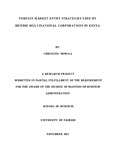| dc.description.abstract | In view of the globalization of the world economy, one of the critical questions to examine in
establishing an international development strategy is to select the entry mode in the target
foreign country. Selection of the entry strategy comes with related costs and challenges and
can ultimately lead to failure or eventual success of the multinational corporation. This paper
sought to assess the foreign market entry strategies used by the MNC’s with a focus on
British MNC’s in Kenya.
The descriptive survey design was applied targeting a population of all the current and past
British MNC’s in Kenya. The study used Non probability sampling technique to select British
MNC’s operating in Kenya. Further, the study purposively selected the sample using the
following criteria: The MNC’s should be registered or member of the British Council, the
MNC should have operated in Kenya for more than 5 years and should not be publicly listed
at the Nairobi Securities Exchange. A sample size of 15 (fifteen) companies was randomly
drawn from the companies that had fulfilled the criteria. A questionnaire was distributed to
the selected MNC’s.
Findings regarding the pre-entry market environment indicated that the Kenyan market was
sufficient for market entry and growth, the inflation rate was adequate at the time of market
entry, the income distribution in Kenya was adequate to sustain market entry, the political
and legal environment was stable and conducive for entry and they could adequately deal
with the competition. On the other hand, the foreign currency exchange conditions in Kenya
were not conducive for market entry and growth, the taxation and business regulations
conditions were complex and hard to understand, and the monitory and fiscal policies were
not conducive for the market entry Findings on the Pre market Entry Strategies indicate the MNC’s focused on technical innovation strategies, ensured that the products/services to be offered were superior to what
was available, performed extensive research and testing to ensure that the products/services
to be offered would be easily adopted by the market and ensured that the products/services to
be offered were in conformity to the standards and requirements of the country.
The largest number of the MNC’s used the wholly owned subsidiary as their market entry
strategy followed by strategic alliances, joint venture and finally indirect exporting. The
management expressed confidence in the entry strategies by their respective MNC’s and were
of the opinion that if given the opportunity, they would choose the same strategy. | en |

